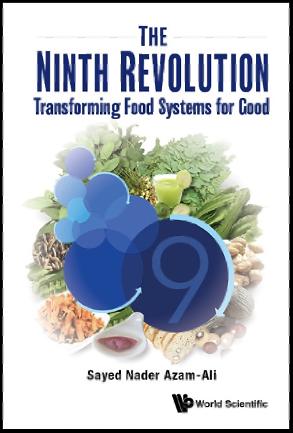A revolutionary approach to nourishing 10 billion people on a hotter planet without destroying the ecosystems on which we all depend
We are at a critical point in human history and that of the planet. Continuing to produce food in the current manner is neither good for public health or for that of the planet. It is time to revolutionise our food systems, to literally transform them for good. This revolution requires a shift in thinking and actions from farmers, processors, researchers and policy makers. We need to see the agrifood system as part of global biodiversity and a critical asset rather than a principal cause of climate change.
Professor Sayed Azam-Ali, OBE, a world leader in agricultural research, envisions the agrifood system as a global public good in which its practitioners include a new and different generation of farmers, its production systems encompass landscapes, urban spaces and controlled environments, its researchers link novel and traditional technologies, and its consumers enjoy diverse, nutritious and healthy foods. In The Ninth Revolution: Transforming Food Systems For Good, he proposes nine collective actions that, together, can transform food systems for good.
The underlying emphasis throughout the book is the critical importance of diversifying, not narrowing, the resources that we rely on to feed and nourish us. We have access to vast agricultural biodiversity, but rely on just four crop species to provide over 60% of our food. The treasure trove of currently `underutilized crops’, ignored for so long, has the potential to nourish humanity in the face of extremes of climate change, major losses of biodiversity, and destruction of natural resources. We ignore these potential `crops for the future’ at our peril. As context, the author uses over 40 years of experience in teaching and leading research teams in Europe, Africa and Asia, and his pivotal role in establishing Crops For the Future Research Centre as the first global institution dedicated solely to research on underutilized crops for food and non-food uses.
“This book is destined to become one of the great manifestos of human adaptation for the 21st century, which is shaping up perhaps to be the most dangerous and challenging ever for human civilization,” said Mr Max Herriman, CEO of the international consultancy firm, Sea Resources Management, about The Ninth Revolution.
The book is aimed at a wider public that is increasingly concerned about issues of food and nutritional security, the impacts of a homogenous diet on our health and the consequences of an industrialised food system on sustainable development and climate goals. It provides context and content for undergraduate and postgraduate programmes in agroecology, crop science, natural resource management, food science and nutrition, environmental science, agriculture, climate change policy and genetic resources. It will also be a valuable resource for policy makers, international development agencies, innovators in agriculture and food systems and thought leaders as well as think tanks and researchers of international relations and agricultural development.
###
The Ninth Revolution: Transforming Food Systems For Good retails for US$128 / £115 (hardcover) and is also available in electronic formats. To order or know more about the book, visit http://www.
About the Author
After completing a PhD in Environmental Physics at the University of Nottingham, UK, Sayed Azam-Ali worked as a Groundnut Physiologist at the International Crops Research Institute for the Semi-Arid Tropics in India, later returning to Nottingham where he became Professor of Tropical Agronomy and then Chair in Global Food Security. In 2008, he was appointed as Vice-Provost for Research and Internationalization at the University of Nottingham in Malaysia, and in 2011 became founding CEO of Crops For the Future Research Centre (CFFRC), the world’s first centre for research solely on underutilized crops. In 2020 he became CEO of Crops For the Future (CFF) UK. Sayed Azam-Ali is a past Chair of the Association of International Research and Development Centers for Agriculture (AIRCA) and in 2021 was awarded an OBE for ‘services to underutilized crops and increasing food security’ in the Queens New Year’s Honours List.
About World Scientific Publishing Co.
World Scientific Publishing is a leading international independent publisher of books and journals for the scholarly, research and professional communities. World Scientific collaborates with prestigious organisations like the Nobel Foundation and US National Academies Press to bring high quality academic and professional content to researchers and academics worldwide. The company publishes about 600 books and over 140 journals in various fields annually. To find out more about World Scientific, please visit http://www.
For more information, contact Amanda at [email protected].
Media Contact
Amanda Yun
[email protected]
Original Source
https:/





